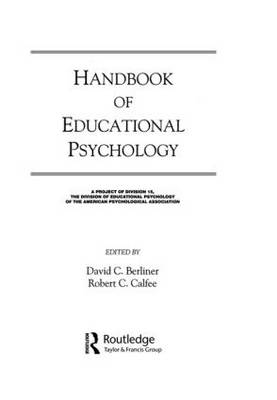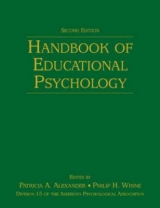
Handbook of Educational Psychology
Routledge (Verlag)
978-0-8058-5080-2 (ISBN)
- Titel erscheint in neuer Auflage
- Artikel merken
The Handbook of Educational Psychology, Second Edition provides an indispensable reference volume for scholars, teacher educators, in-service practitioners, policy makers and the academic libraries serving these audiences. It is also appropriate for graduate level courses devoted to the study of educational psychology.
Contents: P.H. Winne, P.A. Alexander, Foreword. Part I: Foundations of the Discipline. D.C. Berliner, Educational Psychology: Searching for Essence Throughout a Century of Influence. R.C. Calfee, Educational Psychology in the 21st Century. E. Bredo, Conceptual Confusion and Educational Psychology. Part II: Development and Individual Differences. S.G. Paris, F.J. Morrison, K.F. Miller, Academic Pathways From Preschool Through Elementary School. A. Wigfield, J.P. Byrnes, J.S. Eccles, Development During Early and Middle Adolescence. M.C. Smith, T.G. Reio, Jr., Adult Development, Schooling, and the Transition to Work. P.L. Ackerman, D.F. Lohman, Individual Differences in Cognitive Function. G. Matthews, M. Zeidner, R.D. Roberts, Models of Personality and Affect for Education: A Review and Synthesis. D. Fuchs, Cognitive Profiling of Children With Genetic Disorders and the Search for a Scientific Basis of Differentiated Education. Part III: Cognition and Cognitive Process. J. Bransford, R. Stevens, D. Schwartz, A. Meltzoff, R. Pea, J. Roschelle, N. Vye, P. Kuhl, P. Bell, B. Barron, B. Reeves, N. Sabelli, Learning Theories and Education: Toward a Decade of Synergy. G. Schraw, Knowledge: Structures and Processes. M. Pressley, K.R. Harris, Cognitive Strategies Instruction: From Basic Research to Classroom Instruction. R.E. Mayer, M.C. Wittrock, Problem Solving. P.K. Murphy, L. Mason, Changing Knowledge and Beliefs. Part IV: Motivation. N.E. Perry, J.C. Turner, D.K. Meyer, Classrooms as Contexts for Motivating Learning. D.H. Schunk, B.J. Zimmerman, Competence and Control Beliefs: Distinguishing the Means and Ends. E.M. Anderman, C.A. Wolters, Goals, Values, and Affect: Influences on Student Motivation. R.W. Roeser, S.C. Peck, N.S. Nasir, Self and Identity Processes in School Motivation, Learning, and Achievement. Part V: Educational Content. D. Alvermann, M. Simpson, J. Fitzgerald, Teaching and Learning in Reading. S. Graham, Writing. A.H. Schoenfeld, Mathematics Teaching and Learning. M.C. Linn, B-S. Eylon, Science Education: Integrating Views of Learning and Instruction. B. VanSledright, M. Limón, Learning and Teaching Social Studies: A Review of Cognitive Research in History and Geography. A.M. Padilla, Second Language Learning: Issues in Research and Teaching. Part VI: Societal and Cultural Perspectives. J. Martin, Social Cultural Perspectives in Educational Psychology. L. Okagaki, Ethnicity, Learning. D.F. Halpern, Assessing Gender Gaps in Learning and Academic Achievement. J. Juvonen, Sense of Belonging, Social Bonds, and School Functioning. P.M. Greenfield, E. Trumbull, H. Keller, C. Rothstein-Fisch, L. Suzuki, B. Quiroz, Cultural Conceptions of Learning and Development. Part VII: The Educational Context. C. Bereiter, M. Scardamalia, Education for the Knowledge Age: Design-Centered Models of Teaching and Instruction. A.W. Hoy, H. Davis, S.J. Pape, Teacher Knowledge and Beliefs. T. de Jong, J. Pieters, The Design of Powerful Learning Environments. J. Brophy, Observational Research on Generic Aspects of Classroom Teaching. A.M. O'Donnell, The Roles of Peers and Group Learning. S.P. Lajoie, R. Azevedo, Teaching and Learning in Technology-Rich Environments. Part VIII: Assessment of Learning, Development, and Teaching. J.C. Nesbit, A.F. Hadwin, Methodological Issues in Educational Psychology. H. Cooper, Research Questions and Research Designs. D.B. Wright, The Art of Statistics: A Survey of Modern Techniques. D.L. Butler, Frames of Inquiry in Educational Psychology: Beyond the Quantitative-Qualitative Divide. K. Ercikan, Development in Assesment of Student Learning. C.K. Tittle, Assessment of Teacher Learning and Development. P.A. Alexander, P.H. Winne, Afterword.
| Verlagsort | New York |
|---|---|
| Sprache | englisch |
| Maße | 216 x 279 mm |
| Gewicht | 2018 g |
| Themenwelt | Geisteswissenschaften ► Psychologie ► Allgemeine Psychologie |
| Geisteswissenschaften ► Psychologie ► Entwicklungspsychologie | |
| Geisteswissenschaften ► Psychologie ► Pädagogische Psychologie | |
| Geisteswissenschaften ► Psychologie ► Verhaltenstherapie | |
| ISBN-10 | 0-8058-5080-5 / 0805850805 |
| ISBN-13 | 978-0-8058-5080-2 / 9780805850802 |
| Zustand | Neuware |
| Haben Sie eine Frage zum Produkt? |
aus dem Bereich



